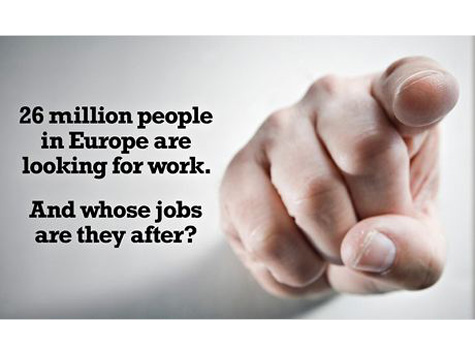
Earlier this week, the UK Independence Party (UKIP) released a series of posters highlighting Britain’s immigration problems, and how Britain has given up its law-making abilities and therefore sovereignty to the European Union (EU).
Some described the posters as ‘good politics but bad economics‘, while Britain’s political establishment tried to portray them as ‘racist’, contrary to public opinion.
But what is the rationale behind the billboards? Here is a brief explanation of each one:

The first poster refers to free movement of labour, something that historically was fairly popular in Britain. Right from the inception of the EU, citizens could live and work in each other’s countries without the need for visas.
This meant professionals could get jobs in the City of London or Frankfurt without any problems. British people retired to France and Spain, and students spent summer holidays doing bar work in whatever country took their fancy.
The impact of these swaps were very limited and generally perceived to be popular. They made it easier for big companies to move staff and it created a whole new real estate boom in the retirement sector.
That all changed when countries like Poland, Hungary and Latvia joined the EU on 1st May 2004. Suddenly millions of poor, unskilled but ambitious young people were entitled to live in the countries of their dreams.
To make matters worse Germany and France put temporary restrictions on movement. These restrictions were not put on by the British Labour government, and since, over 1.2m people have come from Poland alone, causing former Cabinet minister Jack Straw to admit that Labour had underestimated immigration by a factor of ten.
Today, 500 million people are entitled to live in the UK. Obviously most of these will not come, but Britain is experiencing an economic recovery faster than other EU nations. Twenty-six million across Europe are unemployed. UKIP believes there is a real risk that this mass immigration will continue.

Part of the problem with immigration is related to simple supply and demand economics, there is more cheap labour in the market so wages go down. Britain does have a National Minimum Wage but Nigel Farage recently described this as a “maximum wage” because many immigrants are very happy with £6.31, so British workers find it hard to demand more.
Late last year Jack Straw described allowing unrestricted immigration from Eastern European’s as a “spectacular mistake” and as a “well-intentioned policy we messed up”.
As the economy had a downturn after 2008 hard pressed British families, particularly those in lower paid jobs, found themselves undercut by foreign workers. This pushed wages down and cost people jobs. It created a great deal of resentment against the foreign workers, who ironically, were actually doing the right thing by their own families.

The third poster has been a bone of contention in the UK because there is a debate about how many British laws are made in Brussels. The way the EU works is that all laws passed must be implemented in member states, these include crazy regulations like the correct shape for a banana and a law that banned the sale of produce in British Imperial Measures (pounds and ounces).
Local laws that do not comply with EU rules are struck down by the European Court of Justice (not to be confused with the European Court of Human Rights). The system is similar to that of the US Federal Government and the Supreme Court, expect that the government, known as the European Commission is not elected.
Deputy Prime Minister Nick Clegg claims that very few laws are made at EU level. But he really is in a small minority The Prime Minister, Nigel Farage and even the EU Commission Vice-President agrees. The VP Viviane Reding, publicly stated that 70 percent of UK laws were made in Brussels.

Lastly, the fourth poster is a reference to the car service provided to Members of the European Parliament, paid for by taxpayers, as a metaphor for more general waste. All MEPs can book cars to take them anywhere around the town, and they wait at the airport and train station so the VIPs do not have to wait. But the service does not operate 24 hours a day so MEPs are still entitled to claim for taxis.
This is not the only example of waste. In fact the European Court of Auditors have not signed off the EU’s accounts in 19 years. In their latest report they say that unexplained spending has risen 23 percent. EU bosses paid out £5.7billion to projects that were ineligible for funding, of which Britain’s share is £832million.
Overall the UK pays £55m a day to be a member of the EU.
The political left may be outraged by these posters, but they represent the mainstream view within the UK. The Conservatives may be seen as far more pro-European than UKIP but they would tend to agree with much of the sentiment. The party did put restrictions on Romanians and Bulgarians when they entered the EU, and they did fight for a budget cut.

COMMENTS
Please let us know if you're having issues with commenting.